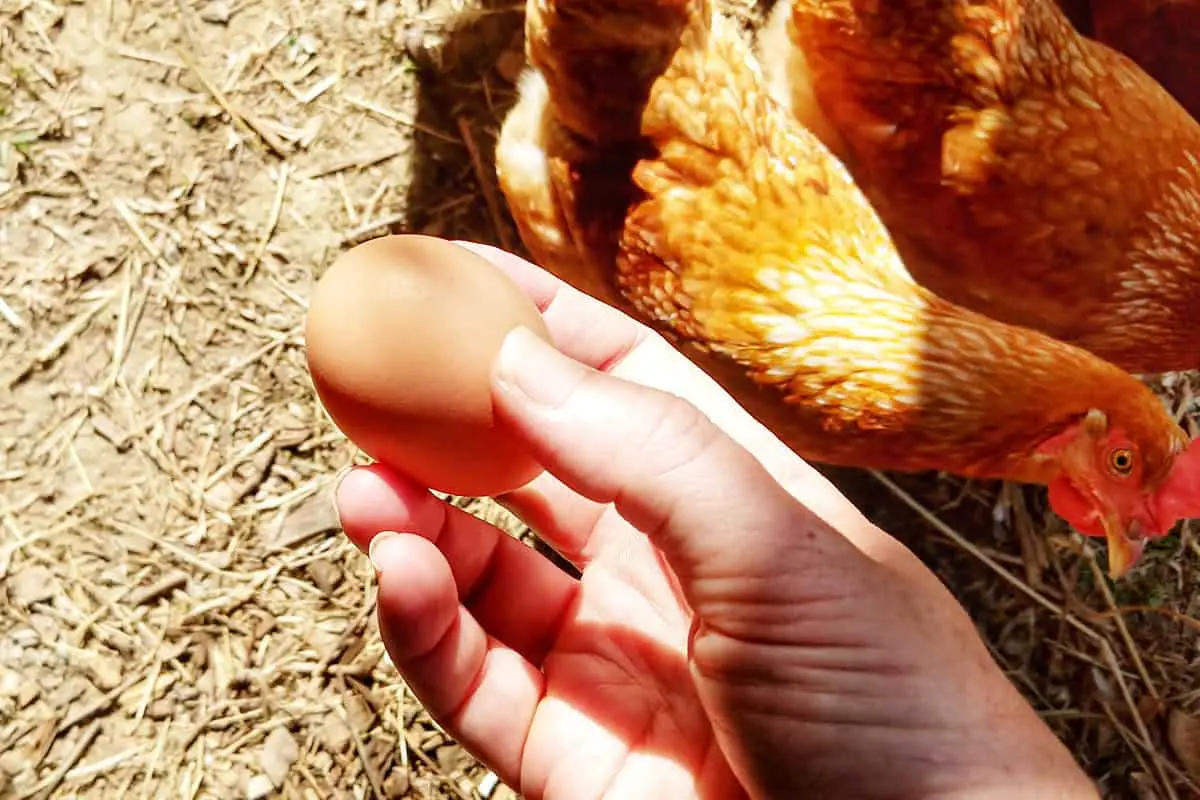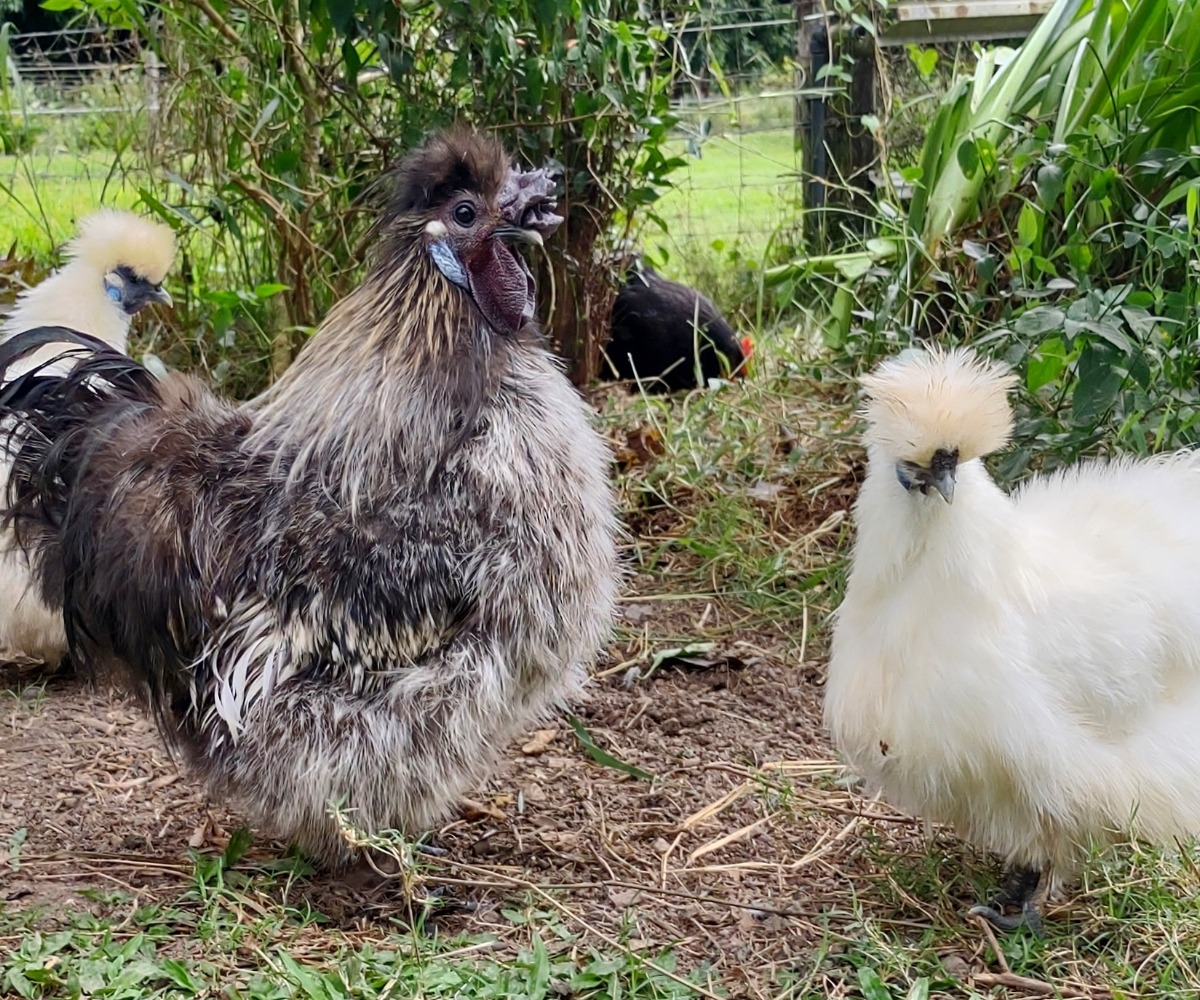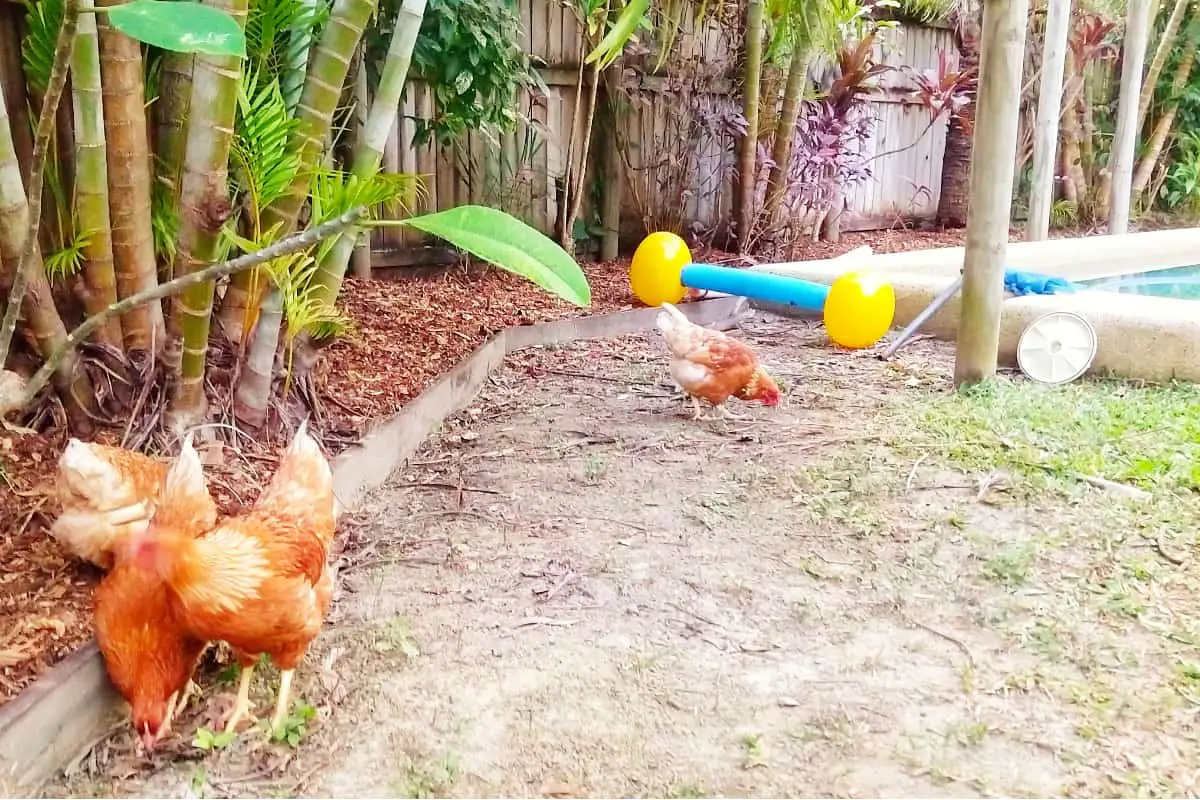Chickens in the tropics do fine, so I’ve been told and seen. Our backyard flock of mixed breed chickens, geese, ducks and guinea fowl are a wonderful addition to our lives, they’re well and healthy and we have plenty of eggs.
But don’t be us. As new tropical chicken keeps, first-timers, we rushed out and bought chickens knowing nothing and with nowhere to keep them. Our girls spent their first night in the shower, which isn’t recommended. The coop we bought at the same time proved not to be a quick assembling project.

Tropical Chickens and Poultry
Nesting boxes, a roost, feeders, bedding, pests, snakes, vermin, parasites and tropical weather are all big considerations if you want to keep chickens in your homestead, farm, backyard or garden in the tropics.

Local laws and regulations, for us, allowed 6 chickens or poultry in our backyard, no roosters. Now we’re on the farm we can apply chicken math and have as much poultry as we like. Be sure to check if chickens are allowed in your area if it is suburban and be aware that chickens can destroy a garden.
For our first small laying flock, we chose point of lay chickens or pullets, this is probably the easiest way to start out in keeping chickens.
We have since branched out into keeping, raising and hatching our own, and bought, straight run chicks. Read our post on guinea fowl vs chickens and the practicalities of keeping the two together.
Sometimes we let a broody hen hatch eggs, other times we hatch eggs in an incubator. This is the type of incubator we bought, it’s a cheap one and it’s been great. Hatch rates have been really good.
As we have now moved to our new farm or homestead, we can keep as much poultry as we like. We’re building our tropical homestead flock day by day and now keep guinea fowl ducks and geese alongside our tropical chickens.
It’s easy to keep guinea fowl with chickens, but male ducks and chickens don’t mix well. We have a very good rooster who protects the chickens from the male duck. The silkie chickens keep to themselves but get along well with the chickens. The geese mix well with the chickens too and haven’t been any problem, but they are very noisy and can be aggressive.
Guinea fowl come in a beautiful range of colours, we now have peach, chocolate, pearl and lavender (pied) guinea fowl free ranging on the farm and hatching keets regularly. Guinea fowl are a good eating bird and their eggs are good to eat too. They also help us by eating ticks and other pest insects.
Keeping Chickens Inside A Pool Fence

This isn’t ideal, and yes, I did worry that they’d fall in and drown, but they didn’t!
We kept our chickens inside the pool fence for a short while before getting better set up. We really were very bad new chicken keepers!
If they were out free-ranging, we were usually very nearby and could see and hear them and the pool.
One did fall in, as expected, after we clipped their wings. Before clipping they could fly the whole length of the pool at low altitude. Clipping one wing threw them all out and splashdown happened.
Chickens can’t swim but they can float briefly, after that they’ll become waterlogged and sink. A quick cluck and flap and she was out again, so no real problems.
Yes, they could flap up and over the pool fence but they did it rarely. They could still do it after we’d clipped their wings. Maybe we weren’t brutal enough with the scissors.
Part of me didn’t want to do it because they fly to escape predators and I didn’t want to interfere with their natural chicken-ness, but we did and I wish we hadn’t. We’ll let them grow back now and once they’re in their purpose-designed snake-proof chicken palace it wasn’t a problem.
We moved them to live in the shade of the jackfruit, mango, grapefruit, and curry leaf trees.
Chicken poop is your pool is not hygienic, nobody ever uses our swimming pool so it wasn’t a concern.
First Things to Know About Keeping Chickens
All of this information came from the lady in the chicken shop, YouTube, Google and, watching our own chickens.
A lot of this chicken-related information took us by surprise, we were completely new to chicken keeping, absolute beginners.
- Chickens eat almost anything from grass to meat to dairy and love most tropical fruits.
- Convincing them to eat anything, when they’ve been raised on grain – is proving difficult.
- They really like ripe jackfruit and avocado, along with pecking at my tropical spinach plants and kale. You need to chicken-proof your garden.
- Our egg-laying chickens have no meat on them and wouldn’t be worth eating.
- Chickens, particularly young chickens, can be taken by dogs, hawks, eagles, snakes, owls, giant rats, dingoes, goannas, and probably more. A secure snakeproof coop is essential.
- Chickens need preventative treatments for worms, fleas, lice, and various parasites.
- Chickens have vaccinations – who knew?
- They put themselves to bed at night at sunset – it’s adorable.
- They can fly, but they don’t bother much.
- Clipping their wings is very easy, find a YouTube video on that.
- They scratch huge holes in your mulch and pull up your seedlings.
- They need a roost, a high perch to use at night.
- They need a nesting box too, to lay eggs in, not to sleep.
- Their night-time residence must be snake proof.
- You can suspend their food and water dispensers from the roof to keep rats, mice, cane toads, and chicken poop out of it.
- Chicken poop stinks, but its much milder than duck or goose poop.
- We’ve been promised one egg per day for several years from our chooks
- Young chickens start laying at around 18 weeks old.
- Our first eggs were small and nothing special, they got bigger.
- You will feel like a farmer, locking them up at sunset, letting them out at dawn.
- Chickens are cute and have real personalities. Penny is our trouble maker and escape artist.
- In the tropics, chickens will need protection from torrential rain, mud, and, of course, intense heat.
- They will destroy your garden if it is small.
What Chickens Live in The Tropics?
In the tropics, we keep silkies, bantams, Australorps, Frizzles and Isa Brown chickens. They all do well, lay, and look really healthy.
We also keep guinea fowl, ducks and geese and are looking to buy more breeds of chicken. It seems that most breeds do really well in a tropical environment.
More ramblings on keeping chickens and other birds in the tropics soon!